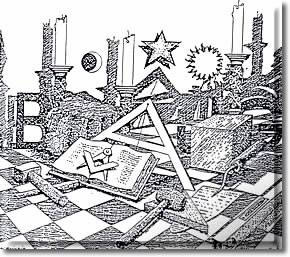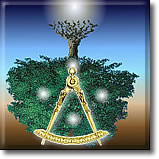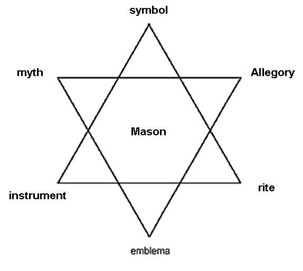Introduction to the Rituals of the Symbolic Degrees

UNIVERSAL FREEMASONRY
Obedience of Piazza del Gesù
RITUALS OF THE SYMBOLIC DEGREES
Short Essay on the history of Freemasonry
Historically modern Freemasonry was born on the 24th June 1717 with the constitution of the Grand Lodge of England; it was the result of the merging of four existing Lodges in the city of London.
The physicist and theologist Theophilus Desaguliers, the archaeologist Payne and the Court theologist James Anderson were responsible for this event.
Nevertheless, on an ideal plane – which is necessary when dealing with the historical outline of a Doctrine that has accompanied the hard labor of man for a long time – we have the clear impression that it is much older. Some people might date it back to 1390, with the compilation of the old ‘Obligations’ imposed to the Initiates, kept at the ‘Royal British Library’. Indeed, this would be only a small part along the long path of research.
The Idea and the Spirit that animate Freemasonry come from medieval Corporations; these were the continuation of Roman Corporations which, on their turn, synthesized mysteriosophical traditions of Greece and Egypt. These ancient traditions have obviously supported the fresh and impetuous lines of thought and life originating from secret Associations of Gnostic, Hermetic and Esoteric origins, with a margin of necessary growth.
Leaving aside exaggerations, which are, by the way, manifestations of attachment and love for the Idea, it is a fact that the Masonic Spirit rules a law of evolution and preservation; therefore a small minority has had the possibility to fight and win all the battles thrown at them by forces of Ignorance, Fanaticism and Superstition. In Italy modern Freemasonry starts its life in Florence in 1733. It quickly expands to Milan, Verona, Padua, Venice, Rome and Naples, were it becomes big and important.
In the small space of five years – from 1775 to 1780 – 300 more Lodges are active in Italy.
Despite many adversities it naturally fits into the picture of demands of Risorgimento, with important men like Cavour, Mazzini, Garibaldi, D’Azeglio, Carducci, Crispi, Cavallotti, etc.
Genealogic Tree of Freemasonry

(click on the image to see the diagram)
On the Masonic Morale
The neophyte must patiently start building the Temple of Truth, brick after brick. He makes a mistake if he enters the Family expecting immediate and undeserved favors.
We work for the welfare of the Humankind without wishing for privileges and rewards.
Lack of patience, or even worse the assumption that we can shoot to the top without a matured ritual and esoteric preparation is a blameworthy delusion; as such it would lead to bad results.
We must say, for example, that it is a mistake for the man who is privileged in the profane life to consider himself higher up, detached from his Brothers less successful than him in everyday life.
If such a Brother exists, he should stop and think about ideas of equality and brotherhood. He should try and eliminate by himself the attachment to forms of life contrary to our Institution, which keep him spiritually distant from the Masonic Communion.
These little examples of common behaviors in profane life in contrast with our principles give a clear idea of how metals must be left outside our Temples.
As the neophyte proceeds to perfect his life with the necessary help of Masonic principle, he will certainly get rid of what is against them.
In order to explain the Masonic morale, it is appropriate to quote integrally the ‘ancient’ Masonic precepts, which have a fundamental educational function on the character and moral instruction of adepts.
They are:
-
Do good for the sake of good.
-
Don’t do anything that can degrade or taint your memory.
-
Do to others what you would like others to do to you.
-
Respect old people. Educate the young. Protect children.
-
Obey the laws and work for their improvement.
-
Love good people, pity the weak and avoid the bad. Don’t hate anyone.
-
Speak firmly with great people, sincerely with friends, sweetly with less fortunate people and lovingly with the needy.
-
Don’t judge lightly the actions of men; praise a little and blame even less. Think that in order to judge men it is necessary to sound their heart and understand their intentions.
-
Look for the truth. Respect sincere beliefs and faiths.
-
Respect women; don’t take advantage of your strength to prevaricate.
-
Be a loyal guardian for your son; work until he believes, loves and respects you. Be Master, Father and Friend to him.
-
Strive to know men in order to know yourself.
We must point out that if these precepts were observed by all men, they would change the face of the world.
The goal of Freemasonry is to allow men to knock down the barriers that divide them and be brothers. This hasn’t been accomplished yet; this is why our Temple is not finished yet, it is not covered and its ceiling is the starry sky.
In this Temple Masons gather to work for the welfare of the Humankind. They use symbols to help the perception and the acquisition of their occult meaning.
Freemasonry urges action, causes thoughts, and organizes the work of the most enlightened towards the weakest members. Those who are in any way privileged will behave towards the less fortunate like older brothers towards their siblings; in this way all the problems of cohabitation of citizens, peoples and States will be resolved.
Progress and science are products of the whole Humankind. Freemasonry assumes that benevolence towards the others implies inner happiness; therefore the Lodge has a beneficial effect on the man who attends it with love. He finds nourishment for his intelligence, the chance to think, the instrument for moral progress and as a consequence the satisfaction for the accomplished work.
There are Brothers who never experience these feelings. They use Freemasonry as an instrument to reach their ambitious goals and then they abandon it to beg for favors in other environments, instead of staying among loyal friends.
There are others who are discouraged when facing the first difficulties of assimilation and they abandon such a lively Institution that they didn’t bother understanding and studying. They are disappointed because they expect impossible things or they didn’t find the chimeras they dreamed of.
Edited by Athos A. Altomonte and Adriano Nardi
